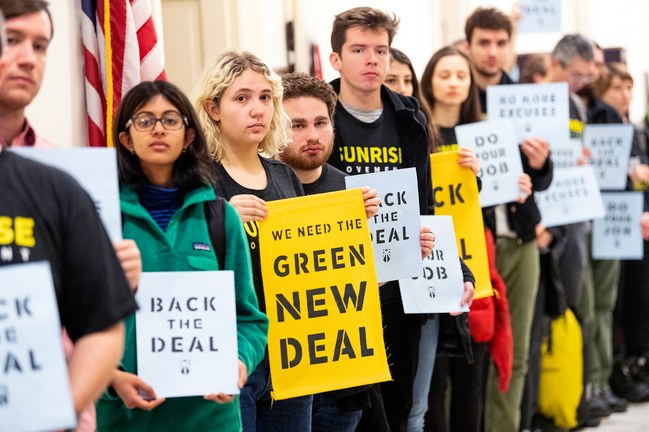- About
- Topics
- Picks
- Audio
- Story
- In-Depth
- Opinion
- News
- Donate
- Signup for our newsletterOur Editors' Best Picks.Send
Read, Debate: Engage.
Proponents of the Green New Deal— a non-binding resolution seeking to completely transition the U.S. economy to renewable energy while simultaneously promoting social justice and income equality—have been facing resistance from a new front: labour unions.
Evidently, it isn’t only Congress members and Senators that waver in their willingness to get behind the Deal, but also representatives of the very people the resolution seeks to uplift—American workers. As of last week, only one major labour union has thrown its support behind the initiative, whereas the rest have either chosen to remain silent or openly criticize the Deal and its objectives.
32BJ, an East Coast-based union representing over 160,000 door attendants, cleaners, and security workers, has thus far been the only major union to openly endorse the Green New Deal. Back in February, ’s Joint Executive Board passed a resolution in support of the deal, recognizing the urgency of climate change and the importance of marrying climate policy with economic justice resolutions.
Alas, other labour unions in the country have failed to follow in 32BJ’s example, with the majority of them opting to refrain from commenting on the Green New Deal at the moment. Others, such as Laborers’ International Union of North America (LIUNA), have come out in condemnation of Rep. Alexandria Ocasio Cortez (D-NY) and Sen. Ed Markey (D-Mass.)—the Deal’s authors—accusing them of promoting “dangerous” resolutions that will most likely deepen income inequality and insecurity of American labourers.
LIUNA’s visceral objection to the Green New Deal doesn't come as a surprise, given the union’s proclivity to err on the wrong side of history when it comes to social and climate justice campaigns (back in 2016, for instance, the union fervently backed the construction of the Dakota Pipeline).
LIUNA, however, has not been the only union publicly criticizing the initiative. Just two weeks ago, a group of seven different building industry unions submitted a joint letter to the House Energy and Commerce Committee, in which they detail their concerns regarding the “unrealistic solutions” promoted by the Green New Deal.
Naturally, a bulk of the resistance to the Deal emanates from workers in the gas and oil industries. In an interview for The Intercept, Phil Smith, spokesperson for the United Mine Workers of America, voiced the union’s concerns regarding the Deal’s definition of a ‘just transition’ into a green economy, stating that “We think it’s very important to find out what a ‘just transition’ actually means and who gets to define it...And will people be paid what they’re earning now, with the same level of benefits? None of that has been clarified… It seems to us there’s a very naive view about what this is going to cost and where the money is going to come from.”
All in all, labourers’ concerns regarding the proposals set forth in the Green New Deal are perfectly legitimate, particularly since while the resolution lays out the “what”, it arguably fails to highlight the “how” as far as its objectives are concerned. It should be taken into consideration, however, that at this stage the Deal functions merely as a non-binding outline for subsequent policy proposals, and that specific details on how to achieve its goals will be hashed out later on as the resolution makes its way through the House and Senate floors.
Coming out in defence of the Deal, Evan Weber, the political director and co-founder of the Sunrise Movement (a youth-led activist group which constitutes the force behind the resolution), has accused LIUNA of misrepresenting climate change, lying about the Deal, and thus marring the otherwise legitimate concerns of workers. In an interview for The Intercept, Weber states, “I think the job guarantee is a really critical element of the Green New Deal. It doesn’t say if you’re a coal miner, you’re now going to go work on installing solar panels; it asks what are the jobs that make sense for your community and have this transition be something that’s locally determined.”
What’s certain is that laborers’ support of the Green New Deal is crucial for its survival. Yes, it is industry giants, dripping petroleum honey into the ears and pockets of politicians, who will ultimately need to be defeated in order to transition away from coal. Yet, the power of American laborers (particularly in industries whose operations are linked to pollution) and the agenda behind which they opt to throw their support (both through lobbying efforts and in the ballot box) is not to be underestimated. Understanding that, the Sunrise Movement intends to launch a comprehensive campaign in order to boost workers’ support of the Green New Deal, making stops in key spots along the Rust Belt.
Ultimately, the manner in which proponents of the Green New Deal handle legitimate criticism and concerns will determine whether the initiative would obtain the support of America’s workers, without which the stride towards a greener future would resemble more of a trudge.
